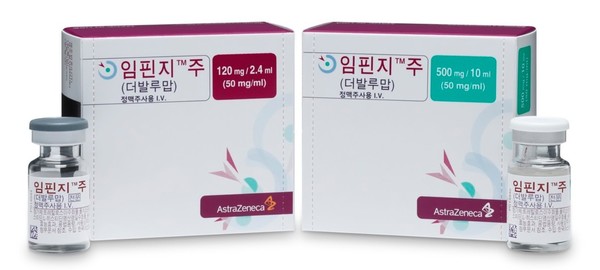Whether AstraZeneca’s anti-PD-L1 immunotherapy Imfinzi (ingredient: durvalumab) will become the first immunotherapy option to treat biliary tract cancer is drawing attention.
The U.S. FDA has been reviewing Imfinzi’s indication for biliary tract cancer treatment since May. Observers say that the regulatory agency is expected to decide by the third quarter.

The TOPAZ-1 study, which was the basis for the Imfinzi permit, drew particular attention from Korean researchers because the global phase 3 trial resulted from an investigator-initiated study led by Korean physicians.
AZ seeks to expand Imfinzi’s indication as a combination therapy with conventional chemotherapy (gemcitabine plus cisplatin) for the first-line treatment of locally advanced or metastatic biliary tract cancer.
The push is based on the outcome of the global phase 3 TOPAZ-1 study, released during the 2022 American Society of Clinical Oncology Gastrointestinal Cancers (ASCO GI) Symposium in January.
At the time, professor Oh Do-youn of medical oncology at the Seoul National University Hospital gave the oral presentation because TOPAZ-1 was designed based on the results of the local phase 2 study led by Oh.
TOPAZ-1 is a global, randomized, double-blind, and placebo-controlled phase 3 trial of Imfinzi in combination with chemotherapy (gemcitabine plus cisplatin) versus placebo in combination with chemotherapy as the first-line treatment in 685 patients with advanced biliary tract cancer.
The trial was conducted across 17 countries, including the U.S., Europe, and South America. About 55 percent of the patients were enrolled in several Asia countries, including Korea, Thailand, Japan, and China.
If Imfinzi wins the nod from the FDA, it could also obtain accelerated approval in Asian countries, including Korea.
The results of TOPAZ-1 showed that the Imfinzi-containing regimen led to a 20 percent reduction in the risk of death compared with the placebo-containing regimen.
However, the Imfinzi group extended the median overall survival only by 1.3 months compared with the control arm.
The most common adverse events were anemia (48.2 percent), neutropenia (31.7 percent), and nausea (40.2 percent). In 62.7 percent of the Imfinzi combo group, potentially serious adverse events occurred, versus 64.9 percent of the placebo group. This signals that most adverse reactions were due to chemotherapy in both groups.
Evaluate Vantage, a global market research company said Imfinzi was likely to be the first immunotherapy in first-line biliary tract cancer despite underwhelming data.
Although Imfinzi extended the median overall survival by 1.3 months, there is a lack of treatment options in primary care for biliary tract cancer. This could prompt the FDA to grant the permit, Evaluate Vantage said.
Targeted therapies targeting FGFR2 or IDH1 mutation have won approval as second-line therapy for biliary tract cancer.
However, no treatment option proved survival extension compared to chemotherapy in a first-line setting.
In the first-line setting, MSD tests the combo of Keytruda (pembrolizumab) and chemotherapy in phase 3 Keynote-966 study.
Roche is conducting a phase 2 Imbrave-151 study to test Tecentriq (atezolizumab) plus chemotherapy, with or without Avastin (bevacizumab).
However, both studies are expected to be completed by next year.

